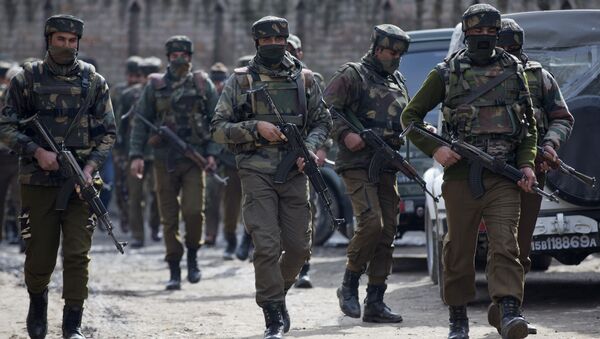New Delhi (Sputnik) — India's security agencies are facing a new challenge in the state of Jammu and Kashmir: the growing proliferation of contraband drugs and other psychotropic substances to which the state's youths have fallen victim. Authorities suspect it to be the handiwork of Pakistan-based terrorist organizations intending to fulfill their sinister ambitions by destroying the state's youth population while using the money earned from peddling the substances to fund terrorism.
"One of the important facts is that, recently, narcotic substances are produced locally in large quantities in four districts of South Kashmir in Pulwama, Shopian, Kulgam, and Anantnag. Cannabis and opium are cultivated here as the land is suitable. Agencies from across the border (Pakistan) pay the local people for commercial cultivation of cannabis and opium. Apart from that, large quantities of drugs are also smuggled into the valley from across the border. Their main aim is to make the state's youth population addicted to narcotics so that they can create a crisis so large that it ultimately impedes the smooth functioning of the state administration. Further, drugs are also used to fund terror in Jammu and Kashmir," a resident of Shopian told Sputnik on condition of anonymity.
Recently, Jammu and Kashmir's top cop, S P Vaid, had revealed that 20-25 percent of the narcotics were smuggled from the neighboring state of Punjab while the source of the remaining bulk was traced to Pakistan. He said he was very much sure that drugs were being used as a means to garner funds for terror activities in the state.
Breaking: #Jammu_Kashmir is facing #narco-_terrorism and a majority of drugs being #smuggled into the state are from across the #LoC, DGP S P Vaid said Saturday.
— Kashmir Observer (@kashmirobserver) December 9, 2017
https://t.co/YlH1B2hfT4 via @kashmirobserver
"A massive crackdown has been launched against drug peddlers and the pressure built on the people involved in this illicit trade will continue," Vaid was quoted as saying by the news agency PTI.
The menace has acquired such an enormous proportion that some strategic experts have termed it as an "indirect war against India."
"Pakistan has been successful in destroying Punjab by smuggling huge quantities of drugs via the international border with India. These drugs have deeply affected the youth and their families. It is estimated that the current stock of drugs available to the peddlers in Punjab will last for ten years. After Punjab, Pakistan's target is Jammu and Kashmir. Pakistani agencies are pushing drugs into Jammu and Kashmir through the Akhnoor border and through the gaps at the International Border. This is an indirect war against India," Pravas Kumar Mishra, a senior fellow of the Vivekananda Foundation and former additional director genera of the Border Security Force, told Sputnik.
Security agencies have been on high alert conducting covert as well as overt operations to mitigate the smuggling of narcotics into Jammu and Kashmir. Modern tracking techniques have been acquired to trace drug peddlers and their contacts on the other side of the border. This year alone, 667 drug traffickers were arrested from across the state.
"The drugs which are coming in the Kashmir valley are utilized for generating funds for fighting terrorism and over a period of time, Pakistan and ISI has been sending the drugs. These drugs are then sold in the open market and the money which is generated is utilized for fomenting terrorism. At the same time it has another adverse impact that the youth of Kashmir is getting addicted to drugs and over a period of time we will see that the new generation will be spoiled," Major General (Rtd) A K Siwach, a former additional director general of the Territorial Army, told Sputnik.
On the global scale, these drugs are mainly coming from Afghanistan and then smuggled into India through Pakistan. India has already conveyed its concerns to the UN over the increase in opium production in Afghanistan.
"The international networks that control this illegal trade have to be identified and tackled. The problem needs to be addressed through verifiable measures and actions," said India's deputy permanent representative to the UN, Tanmaya Lal, while participating in a recent debate on the Afghan situation.
The UN Office on Drug and Crime (UNODC) in its Afghan Opium Survey 2017 report said that the area under poppy cultivation rose by 63 percent, while the production of opium has climbed 87 percent to an estimated 9,000 metric tons in the last few years.


